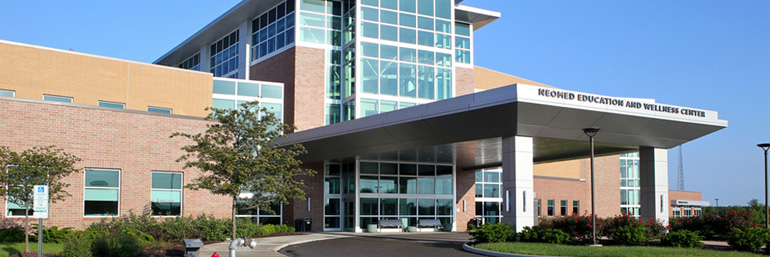Jun 21

Health Care Leaders Convene at NEOMED for Crain’s Health Care Forum
How is the opioid crisis affecting large health care institutions in Northeast Ohio? And what could these organizations do to better combat the epidemic?
How can workplaces create a culture of wellness?
These were key questions during a day of panel discussions and presentations comprising the Crain’s Health Care Forum Wednesday, June 20, held at the Northeast Ohio Education and Wellness (NEW) Center. Representatives of hospitals and other health care providers, businesses and non-profits attended.
NEOMED and the NEW Center were title sponsors of the event. Elizabeth McIntyre, publisher and editor of Crain’s Cleveland Business, moderated the opening panel of leaders from MetroHealth, Akron Children’s Hospital, Sisters of Charity Health System, University Hospitals Seidman Cancer Center and the Cleveland Clinic.
Need for training
People providing care to those with addictions face unusual stressors, said panelist Tom Strauss, president and CEO, Sisters of Charity Health System in Cleveland. Patients with addiction often act out in rage and fear when in detox, or they leave against medical advice. Caregivers need addiction medicine training, he said.
Panelist William Considine, CEO of Akron Children’s Hospital, pointed to the need for sessions such as so-called Schwartz Rounds, at which caregivers meet to discuss the emotional aftermath of especially stressful situations such as school shootings.
Creating a culture of health
As chief health officer, The Goodyear Tire & Rubber Co., Brent Pawlecki, M.D., oversees a global company’s strategy for health and wellness. Dr. Pawklecki noted that one huge need is for more attention to employees’ emotional health. Telehealth could be an important tool to help address the shortage of mental health providers, he said.
Panelist Francoise Adan, M.D., medical director, Connor Integrative Health Network, University Hospitals, said that a culture of wellness begins at the top of an organization. Don’t send email at 4 a.m., or brag, “I don’t need to sleep,’’ she advised. While wellness programs usually address “what’s happening below the neck,’’ people need a more holistic treatment. Employees of all kinds need help with stress management and resilience training, Dr. Adan said.
Know your patient’s world
And speaking of treating the patient holistically, the need to understand patients and how their individual circumstances affect their medical needs, emerged often during the day.
Panelist Donald Ford, M.D., family physician at Cleveland Clinic and chief medical officer of Better Health Partnership, put things in nutshell: “It’s not up to me as a family doctor to know how to remove lead paint. It’s up to me to know who does.’’

